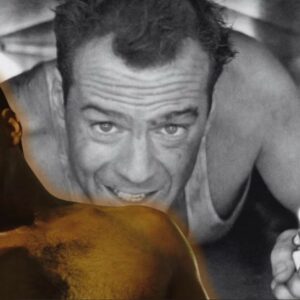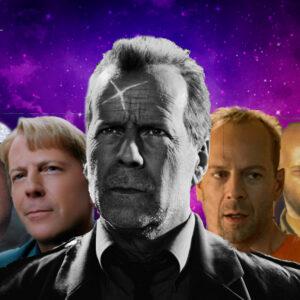From the streets of Newark, New Jersey, to Hollywood’s red carpets, Queen Latifah has always been a force to be reckoned with. She broke into the entertainment world as a rapper, a pioneering woman in a male-dominated genre, before seamlessly transitioning into acting and producing. Queen Latifah’s career is a testament to her versatility and tenacity. But beyond her accolades, Latifah has consistently used her platform to advocate for something bigger than herself—diversity in film and television. In an industry often criticized for its lack of representation, Queen Latifah has been a trailblazer, pushing for inclusivity in every aspect of filmmaking, both on-screen and behind the camera.
As an actress, rapper, and producer, Latifah’s career is a tapestry of groundbreaking achievements. From her role in the hit TV show Living Single to her Oscar-nominated performance in Chicago, she has consistently challenged the status quo. But what truly sets Queen Latifah apart is her relentless pursuit of diversity in the entertainment industry. She believes that Hollywood should mirror the world we live in, a sentiment she has voiced throughout her career.
Queen Latifah’s Advocacy for Diversity
Latifah’s advocacy for diversity isn’t a new development. It dates back to the early days of her career when she was one of the few Black women in hip-hop. She knew firsthand the barriers that women of color faced in the entertainment industry, and she used her platform to speak out against them. Her belief in diversity extends far beyond race—it includes gender, sexuality, age, and background. Latifah has always emphasized that true diversity means representing the full spectrum of human experience.
As a Black woman in Hollywood, Queen Latifah faced her own set of challenges. She has spoken openly about the difficulties of navigating an industry that often pigeonholes Black women into stereotypical roles. But instead of allowing those challenges to deter her, she used them as fuel to advocate for change. Latifah’s advocacy has always been rooted in her personal experiences. She understands the importance of representation because she has lived it.
“I’ve been in this industry for a long time, and I’ve seen how much representation matters,” she once said in an interview. “It’s not just about putting diverse faces on screen—it’s about telling diverse stories. It’s about reflecting the world we live in.”
The Power of Representation
For Queen Latifah, representation isn’t just a buzzword—it’s a powerful tool for change. She believes that seeing people of diverse backgrounds in lead roles can inspire and uplift marginalized communities. Representation, according to Latifah, has the potential to break down stereotypes and shift societal perceptions. In her eyes, media has an unparalleled power to influence the way people think, and by showcasing diverse stories, Hollywood can challenge long-held biases.
Latifah often cites her own experiences growing up as motivation for her views on representation. She remembers the impact of seeing Black women on screen and how it made her believe that she, too, could achieve greatness. “When I saw women who looked like me, it gave me hope,” she has said. “It made me believe that I could do anything.”
Her role in Living Single is a prime example of how representation can make a difference. The show, which aired in the 1990s, centered around a group of Black women living in Brooklyn, navigating their careers, relationships, and friendships. It was one of the few shows at the time that portrayed Black women as multidimensional characters with full lives, and it resonated with audiences across the country.
Latifah has always been vocal about the need for more shows like Living Single, which reflect the diversity of the real world. “We need to see more of us,” she has said. “Not just as supporting characters, but as the leads. We need to see ourselves in every type of role—comedy, drama, action. That’s the power of representation.”
The Importance of Inclusivity in Storytelling
Queen Latifah’s commitment to diversity isn’t limited to what happens in front of the camera. She is also a fierce advocate for inclusivity in storytelling, ensuring that the stories being told reflect the real-world diversity of human experiences. As a producer, she has pushed for projects that spotlight underrepresented voices and break away from traditional Hollywood narratives.
One of her most notable projects in this regard is The Equalizer, in which she stars as the lead. The show not only features a strong Black woman in the role of an action hero—something still relatively rare in Hollywood—but also tackles issues of race, gender, and social justice. By producing and starring in such a show, Latifah is sending a clear message: Inclusivity in storytelling is not just important; it’s essential.
Another example of her commitment to inclusivity is her work on Bessie, the HBO film about blues legend Bessie Smith. Latifah not only portrayed Smith but also served as an executive producer on the film. Bessie tells the story of a Black, bisexual woman navigating the complexities of race, gender, and sexuality in the early 20th century—a story that Hollywood might have shied away from in the past. But Latifah was determined to bring it to life, and in doing so, she helped ensure that underrepresented stories continue to be told.
For Latifah, inclusive storytelling is about more than just casting diverse actors—it’s about making sure that the stories being told are authentic and reflective of the world we live in. “It’s not just about putting people of color on screen,” she has said. “It’s about telling stories that matter, stories that reflect our lives and our experiences.”
Breaking Barriers Behind the Camera
Queen Latifah’s commitment to diversity extends beyond her roles as an actress and producer. She is also a staunch advocate for diversity behind the camera, recognizing that true representation requires decision-makers from various backgrounds. Latifah has long been a supporter of initiatives that focus on nurturing talent from underrepresented groups in the film industry.
She has worked to promote diversity in directing, writing, and producing, understanding that these roles are crucial in shaping the stories that get told. Latifah believes that having diverse voices in these positions ensures that the stories being told are more authentic and resonate with a broader audience.
In interviews, Latifah has spoken about the importance of having diverse perspectives behind the camera. “When you have people from different backgrounds making decisions, you get a richer, more nuanced story,” she has said. “That’s what we need in Hollywood—more voices, more perspectives, more stories.”
Latifah has also been involved in several collaborations aimed at increasing diversity in Hollywood. She has partnered with organizations that provide mentorship and support to young filmmakers from underrepresented communities, helping to pave the way for the next generation of storytellers.
Call for Change in the Industry
Despite the progress that has been made, Queen Latifah knows that there is still a long way to go when it comes to diversity in Hollywood. She has been vocal about the need for systemic change in the industry, calling on Hollywood to embrace more opportunities for diverse talent.
Latifah has advocated for diversifying hiring practices, supporting independent filmmakers, and amplifying voices that have historically been silenced. She believes that real change will only come when Hollywood makes a concerted effort to uplift underrepresented voices, both in front of and behind the camera.
In recent years, Queen Latifah has called on industry leaders to take concrete steps toward increasing diversity. She has emphasized the importance of creating pipelines for diverse talent, from entry-level positions to executive roles. Latifah believes that by supporting talent from all backgrounds, Hollywood can create a more inclusive industry that truly reflects the world we live in.
“We can’t just talk about diversity—we have to make it happen,” she has said. “It’s about creating opportunities for people who have been left out for too long. It’s about making sure that everyone has a seat at the table.”
Conclusion
Queen Latifah’s impact on the conversation around diversity in film cannot be overstated. As an actress, rapper, producer, and advocate, she has used her platform to push for a more inclusive Hollywood. Through her work both on-screen and behind the scenes, Latifah has demonstrated the power of representation and the importance of telling diverse stories. Her vision for a more inclusive industry is one where everyone’s stories can be told and heard, and she continues to be a driving force in making that vision a reality.
In a world where representation still matters, Queen Latifah’s voice is as important as ever. She reminds us that diversity isn’t just about numbers—it’s about reflecting the world we live in and ensuring that all voices have a chance to be heard. Her legacy is one of inclusion, and as Hollywood continues to evolve, Queen Latifah’s contributions to the industry will undoubtedly leave a lasting impact.





